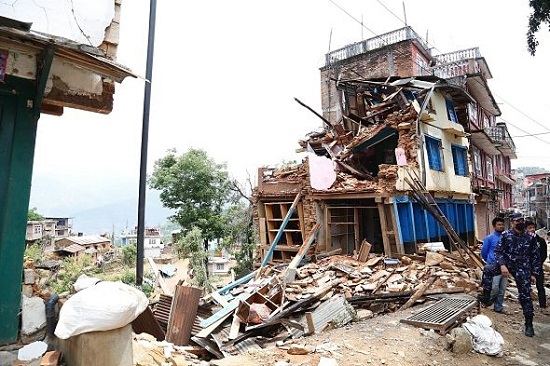
Source: New Internationalist
Kathmandu: the very name conjures up some sort of Shangri-la. Images of a romantic, exotic paradise. It was a hippy haven in the Sixties and Seventies. But before that, of course, there was Everest. There was always the Himalayas, majestic and awe-inspiring to even the most blasé viewer. Serious mountaineers arrived there in hordes for a life-time adventure experience. In recent times, with better accessibility, more people embark on Himalayan treks. For the average Nepali, though, life has always been a grim, poverty-stricken struggle. Known as brave, hard-working, tough, resilient, lovable people, they deserved better. Nepal has seen Maoist terrorism and a violent overthrowing of their monarchy. None of which have helped the economy.
Bombay’s brothels – and Kolkata’s – were always filled with young Nepali girls, working to give their families a roof over their heads, a square meal every day. Tragically, for these girls, a life of squalor, violence and sordidness is the only expectation ahead of them. In village after remote Nepali village, the more resilient tin roof, the slightly better house invariably meant girls working in India, locals pointed out to us in the early nineties.
And on top of it all, this catastrophe. The death toll mounts. The Nepal Prime Minister guesstimates a final total of 10,000 dead, because the figures from unreached rural areas have not yet trickled in. Having written about the Orissa ‘Super’ cyclone in 1999, the Gujarat earthquake in 2001 and the 2004 tsunami, I saw a pattern following disasters.
There was invariably a distasteful rush to the scene, not just of genuine people who wanted to help, but of ‘the disaster tourist circus’: people videoing the calamity, incessantly photographing distraught people. These crass voyeurs were totally devoid of sensitivity or basic decency. There were media hawks too, shoving their cameras in the faces of grief-stricken people, invading their space and their privacy. Then there were the filthy people, the corrupt, waiting to devour the donations meant for rebuilding the lives of the devastated.
In every situation, the disaster-hit people were remarkably dignified. In some instances, they were unbelievable. The stories which did not make headlines were, to me, the most moving. In Orissa, a group of Mumbai students and some British volunteers were preparing to leave after completing the necessary village surveys for relief and rehab materials to be brought in. They were bidding tearful adieus, having becoming deeply attached to the local community after sharing their grief over several weeks. The fishing boats went out to sea for the first time after the cyclone. Orissa has always been one of India’s poorest states, even before being hit by a gigantic calamity. Yet the fishing community had prepared a farewell meal for ‘their’ volunteers. They had cooked up the entire catch. Fish, crabs, shrimp and lobsters – a catch worth a few thousand rupees. A desperately poor people who had lost their homes and every single possession produced a gourmet meal. ‘But this shrimp and lobster is worth a fortune,’ someone protested. They shrugged. ‘These people have shared our sorrow for weeks; they are our guests. It is only right that we feed them well, once, before they leave us,’ the Oriya fisherfolk said. We were stunned at this generosity.
The Gujarat earthquake victims cooked food for a group of foreign volunteers, a week after losing everything, while still in their makeshift, tarpaulin tents. ‘Poor things, they have come from so far to help us. They must be tired and hungry. So we cooked for them’ the Kutchi villagers said.
And in tsunami-hit Nagapattinam, Tamil fisherfolk took a jeep-load of fish and prawns, a month after the disaster, to distribute to the people who had gone there to help them in their time of need.
There are experts already in Nepal to point out the pitfalls. Women and children are the most vulnerable. Orphans were trafficked by heartless relatives after the Orissa cyclone.
A tsunami survivor told me: ‘Millions of dollars came pouring in. Nagapattinam should have been transformed into Dubai or Singapore if every paisa was utilised properly. Thieves swallowed up millions. It’s up to God to punish them.’
My heart goes out to the people of Nepal. The best equipped to help them are perhaps the Japanese, who have turned earthquake relief into a fine art. Aid requests are pouring in from every quarter. I hope enough reaches them directly so that they may finally have a better life. That some good comes out of this catastrophic earthquake. This cruel, cruel tragedy of truly Himalayan proportions.
Mari Marcel Thekaekara is a writer based in Gudalur, in the Nilgiri hills of Tamil Nadu. She writes on human rights issues with a focus on dalits, adivasis, women, children, the environment, and poverty. Mari’s book Endless Filth, published in 1999, on balmikis, is to be followed by a second book on campaigns within India to abolish manual scavenging work. She co-founded Accord in 1985 to work with Adivasi people. Mari has been a contributor to New Internationalist since 1991.
